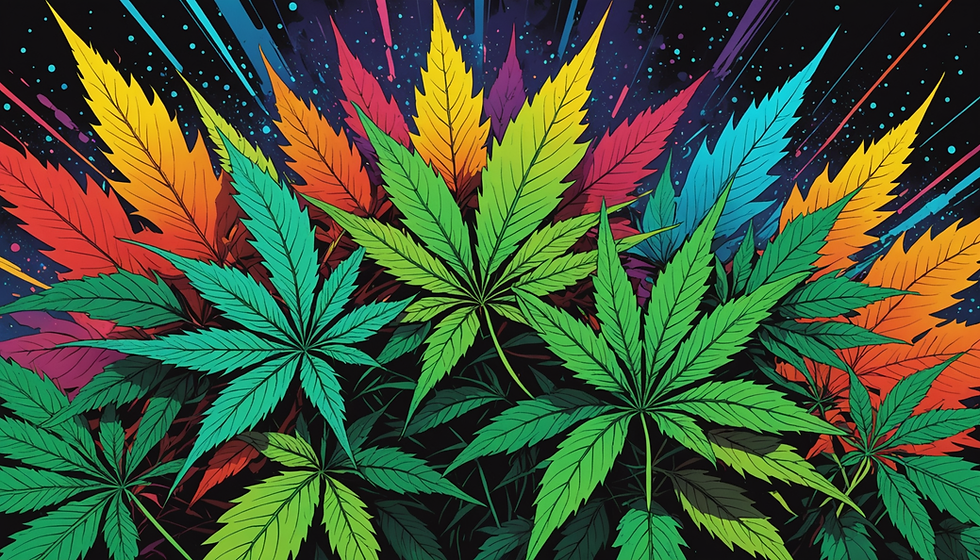THC-A, THC-P, and Hemp: Clearing Up the Confusion
- The Lifted Leaf
- Aug 25, 2025
- 3 min read

When people walk into The Lifted Leaf, one of the most common things we hear is: “Isn’t this fake weed?”
It’s a fair question. There are a lot of new cannabinoids hitting the market- THC-A, THC-P, Delta-8, HHC, and more — and it’s easy to get lost in the details. Let’s clear up some of the biggest questions about THC-A and THC-P, and why they are not “synthetic weed,” but part of the cannabis plant family.

What is THC-A?
THC-A stands for tetrahydrocannabinolic acid. It’s the natural, raw form of THC found in the cannabis plant.
In the flower on the shelf, you’ll find THC-A.
When you smoke or heat it, the process of decarboxylation turns THC-A into Delta-9 THC, which is the compound most people know simply as “THC.”
This means smoking THC-A flower can give you effects similar to traditional THC flower, because it converts during combustion.
So when you see THC-A hemp flower, it’s not “fake.” It’s real cannabis flower that qualifies as hemp because its Delta-9 THC is below 0.3% before heating. Once you light it, the THC-A changes into Delta-9 THC — and that’s why the experience feels the same.
What about THC-P?
THC-P (tetrahydrocannabiphorol) is a naturally occurring cannabinoid that was discovered in 2019. It’s rare in the plant, but it’s there — not synthetic, not man-made out of thin air.
Research suggests THC-P may bind to receptors in the body much more strongly than Delta-9 THC.
That could explain why people describe it as being more potent, even in small amounts.
Many hemp products with THC-P are blended from plant-derived cannabinoids and refined through extraction — not cooked up in a lab like “spice” or K2 (which really are synthetic).
Hemp vs. Marijuana: Same Plant, Different Legal Definitions
Here’s where it gets tricky:
Both hemp and marijuana are Cannabis sativa. Same species.
Legally, the difference is:
Hemp = cannabis with less than 0.3% Delta-9 THC by dry weight.
Marijuana = cannabis with more than 0.3% Delta-9 THC.
So when you buy hemp-derived THC-A flower, you are still buying cannabis. The only reason it can be sold legally under hemp law is because of that Delta-9 THC threshold before it’s smoked.
Clearing Up the “Fake” Myth
A lot of customers worry that cannabinoids like THC-A and THC-P are “synthetic” or unsafe. Here’s the truth:
THC-A is the natural precursor to THC, found in every cannabis flower.
THC-P is rare, but naturally present in the plant. Some products use extraction and concentration to bring it out, but it starts from cannabis.
These are not the same as synthetic cannabinoids like K2 or Spice, which are lab-made chemicals sprayed onto herbs and can be dangerous.
The difference is: hemp cannabinoids are plant-derived and tested, while synthetics are man-made copies with unpredictable effects.
What to Look For as a Customer
If you’re shopping for THC-A or THC-P products, here’s how to stay safe and informed:
Check the COA (Certificate of Analysis): This will show the levels of cannabinoids, including THC-A and Delta-9 THC.
Look for transparent labeling: Reputable brands explain where cannabinoids come from and how they’re extracted.
Ask questions: If something seems too good to be true, or if the labeling is vague, it’s worth being cautious.
Final Takeaway
THC-A and THC-P are not “fake weed.” They are part of the cannabis plant and work with your body’s endocannabinoid system just like other cannabinoids.
The key difference is how the law defines hemp versus marijuana. Hemp cannabinoids give people more legal options, but the plant is still cannabis at the core.
At The Lifted Leaf, we’re here to answer your questions, walk you through lab results, and help you choose products that fit your lifestyle and comfort level. Whether you’re exploring THC-A flower, THC-P blends, or traditional CBD, we’ll make sure you know exactly what you’re getting — real plant medicine, never fake.
Disclaimer:
The content on this blog is for informational and educational purposes only and is not a substitute for professional medical advice, diagnosis, or treatment. Cannabis affects everyone differently. Always consult a qualified healthcare provider before using cannabis or cannabis-derived products, especially if you have a medical condition or are taking prescription medications. These statements have not been evaluated by the Food and Drug Administration, and no medical claims are being made.




